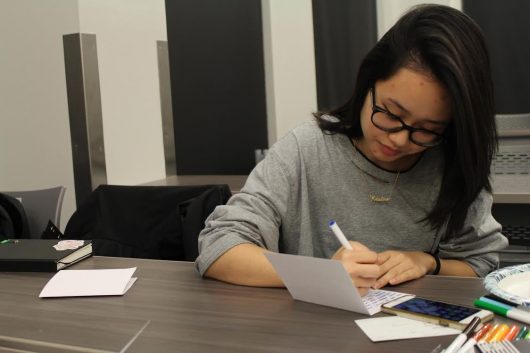
A series of thank you notes and a picture of children at Durihana International School sent to Pen Pals in North Korea. Credit: Olivia Balcerzak | For The Lantern
There are more than 6,000 miles between North Korea and Columbus, but one student group is making up for the distance through letters.
Fourth-year marketing student Sam Lee never knew much about his family members in North Korea, so in the summer of 2014, he decided to volunteer at the Durihana International School in Seoul, South Korea –– an orphanage that houses North Korean refugees.
“I just want general body members to realize that there are so many different people out there in the world, not everybody is as privileged as we are,” Lee said.
Four years later, Lee has rebranded Ohio State student group, North Korea Future Research Organization, into the Pen Pals in North Korea (PPiNK), which aims to bridge the gap between North Korean refugees in South Korea and American students on campus.
After contacting Durihana International School, Lee said he was able to get permission to write letters and send gifts to the children and receive postcards in return.
“I became president and wanted to switch it up a bit,” Lee said. “Last year when we were still the previous [organization], we had a [postcard-writing] event where a lot of people came out and a lot of people wanted to participate. Because that garnered a lot of support, we decided to switch our focus.”
On Jan. 25, Lee received some of the most recent deliveries, among them photos of the same children he spent time with in the orphanage and roughly 50 other pictures and postcards written by refugees at Durihana International School.

Yvonne Le, a fourth-year studying sociology, writes a letter back to her pen pal. The two conversed about sports, hobbies and interests. Credit: Olivia Balcerzak | For The Lantern
While some students might receive a letter back from the same child, the likelihood of speaking with the same person twice is dependent on the child’s adoption status, Lee said. There were some students, though, like Yvonne Le, a fourth-year in sociology, who was among those who did.
“We get a lifelong friendship with little updates on each of our lives,” Le said. “It’s nice to learn about different cultures.”
While Le said she would like to know more about the children’s escape stories, because of the refugee’s minimal experience speaking and writing English, the conversation is a more basic exchange of facts and stories.
However, the hardship of the children’s journey still remains, Lee said, speaking on his first-hand experience of hearing their stories.
“A lot of their stories are really eye-opening,” Lee said. “There’s a river that separates North Korea from China, that’s how usually they escape, so little kids have to cross the river when it’s freezing outside and they get shot at and stuff, so stories like that hurt my heart.”
PPiNK holds an event once a month, with letter-writing taking place every two to three months, contingent on international shipping times and return rates.
Lee said he hopes that sending letters to the refugees will let them know that there are people who want to help.
“We just want to show them that there are still people out there that are interested in them and care for them because they come from such a hard background,” Lee said.


